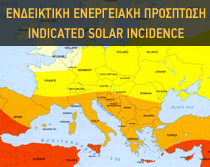Energy-Environment-Ecology.
 Adaptation and measures required by the visible effects of climate change in Greece, according to a new survey of WWF Hellas and the National Observatory.
Adaptation and measures required by the visible effects of climate change in Greece, according to a new survey of WWF Hellas and the National Observatory.
Intolerable cities, tourist destinations heatwaves, difficult times for agriculture, national parks at risk. . Something like that summarizes the main findings of a new scientific report by WWF Greece, "The future of Greece: impacts of climate change in Greece in the near future", presented at a special press conference, the WWF Greece and the National Observatory.
Purpose of the report is to anticipate the effects of climate change in Greece during the period 2021-2050.
This is the first time a survey focusing on impact of climate change in specific areas that are important to the economy and the natural wealth of the country.
. The results of this survey, the existing frustrations of residents in cities will increase.
Residents of cities such as Thessaloniki, Patras, Lamia and Larissa will be subject to up to 20 more days of heat. Furthermore, in Lamia, Larissa, Volos, Thessaloniki and Athens, the total rainfall will decrease, but is expected to increase by 10-20% extreme rainfall.
Therefore the risk of both flood events and to spread suburban forest fires will increase.
. Significantly affected and the tourist destinations of the country. From 5 to 15 more are the days of heat in the relevant departments of tourism, and will increase further and the nights where the temperature will not drop below 20 degrees Celsius, especially in islands such as Rhodes and Hania.
This, combined with high humidity can aggravate the conditions of distress.
Another negative factor is the provision for substantial increase in the risk of spreading fire on the relevant tourist areas.
On the other hand, research shows that will grow in almost a month, days with temperatures above 25 degrees Celsius, which may lead to a lengthening of the season.
The ten largest rural districts in the country would receive heavy pressure from climate change, leading to increased heat days, the consecutive days without rain, to reduce winter rainfall and thus greatly increase the risk of fire.
For example, in Evia is more than 25 more dry days than today, Serres and Larissa will live 20 more days of heat, while in Heraklion and Pella in the winter rainfall will decrease by 15%.
Any provision for possible damage to crops is risky, but the overall findings show an increased risk of desertification new land and a decrease in water availability.
Climate change will pose a terrible ordeal and National Parks, and an increase of days with high risk of fire occurrence in all the Parks in the country.
"Projections for Greece are not promising, which makes even more urgent need for immediate recovery of the investigation by all relevant public bodies and the implementation of a comprehensive adjustment program in the country to climate change," says Christos Giannakopoulos, Principal researcher at the National Observatory and lead author of the report.
It has a duty and obligation not only to take all measures within the country for conserving natural resources, but rather to take initiatives and to require a good deal in Copenhagen in order to avoid the worst impacts of climate change.
The new government must put the issues in Copenhagen and the adjustment of the country in future climate conditions as highest priorities "concludes Dimitris Karavellas, Director of WWF Hellas.
Source: WWF Greece





